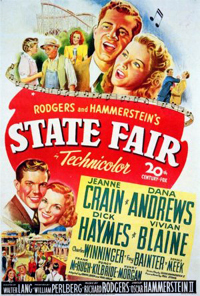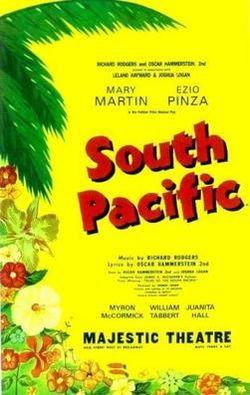Would a musical be produced today that’s built around the idea of sticking with an abusive spouse no matter what and to some extent normalizing the abuse? Could it include the line, “Has it ever happened to you? Has anyone ever hit you — without hurtin’?” To which the answer is yes: “It is possible, dear, fer someone to hit you — hit you hard — and not hurt at all.” And that line is delivered from a mother to a daughter, thus paving the way for perpetuating the cycle of abuse. Honestly! The musical is Rodgers and Hammerstein’s 1945 Carousel, and it’s an odd duck, often labeled as a “problem” musical or even as “the wife-beater musical.” Billy Bigelow, said wife-beater and main villain, echoes other characters in popular theater such as Stanley Kowalski in A Streetcar Named Desire and John Wayne’s character in the film McLintock!, to name just a couple, who hit their wives and not only get away with it but whose wives respond lovingly. (I am horrified by the spanking scene at the end of McLintock!, and apparently it’s not the only such scene in the movie.) When he’s asked about his abuse by the Starkeeper, head man in heaven’s waiting room, Billy Bigelow says he does not beat his wife. “I wouldn’t beat a little thing like that — I hit her,” he explains. But to answer the question I posed at the beginning of this paragraph: Yes, indeed, Carousel is performed today, sometimes with the problematic lines cut and sometimes with them included. One production compromised by having the dead Billy shake his head “No!” in response to the “not hurt at all” line. That’s perhaps the best way to deal with the issue, since just cutting those few lines in no way erases the overall arc of the plot. Indeed, Carousel was considered groundbreaking at the time of its original production because of its anti-hero lead male character and its tragic plot. Rodgers and Hammerstein had already broken new ground in their first collaboration, Oklahoma!, which used the songs to advance a well-developed plot, and Hammerstein had included controversial ideas about racism in his collaboration with Jerome Kern for Show Boat.
Rodgers and Hammerstein
Were the Hills Ever Really Alive with the Sound of Music?

In other words, is there a true story behind the musical? And of course there is, and it’s much more interesting than the plot that could be crammed onto the stage or into a film. (Note the proper use of prepositions.)
We all know that when we see the words “based on a true story” at the beginning of a biopic or a docudrama that we’d better not take the storyline too seriously. Those warnings don’t appear at the beginning of The Sound of Music, but perhaps they should. I’ve thoroughly enjoyed researching the real von Trapp family and would urge you to follow the links below to get a fuller picture than I can give here.
A Song about Singing—“It’s a Grand Night for Singing”

The long road to this song started with a novel, State Fair by Phil Strong, written in 1932. Its unifying event is . . . wait for it . . . the three days of the Iowa State Fair, in which a farm family consisting of a husband, wife, daughter and son have various adventures and romances over that period. And in case you were wondering, yes, the fair is still being held. I just looked it up. Now it lasts 11 days instead of three; the 2021 dates were August 12-22. It’s quite a production these days with all sorts of entertainment and events, some separately ticketed and some included with the general admission charge. There are still the various competitions including livestock, beekeeping and beermaking, and, of course, you can still get food in ample supply—including anything and everything you can eat off a stick. The fair had some COVID advisories in place this year but nothing mandatory; the fair was, however, canceled in 2020, marking the first cancellation of the event since World War II.
What Serious Moral/Social Issue Is Addressed in the Musical “South Pacific”?

And the answer is: racial prejudice. If you don’t know the plot of this musical and think it’s just something lighthearted, you might be surprised by its content. The location is an island in the (where else?) south Pacific during World War II. The central conflict between the two main characters, Nellie the Naval nurse and Emile, the French planter with whom she falls in love, is that Nellie finds it very difficult to accept that Emile has been married before to a “dark-skinned Polynesian” and has two “mixed race” children. It’s only after Emile is almost killed in a secret mission to spy on the Japanese forces that Nellie realizes how much she loves him and his children. Another character, the Naval officer Cable, falls in love with a Polynesian girl, Liat, and that romance is also considered pretty scandalous. He decides that he can’t marry her because of how his family back home would react. He’s killed during the spy mission. But before he goes off to that fate he sings a very famous (and controversial at the time) song about how prejudice develops: “You’ve Got to be Carefully Taught.”

